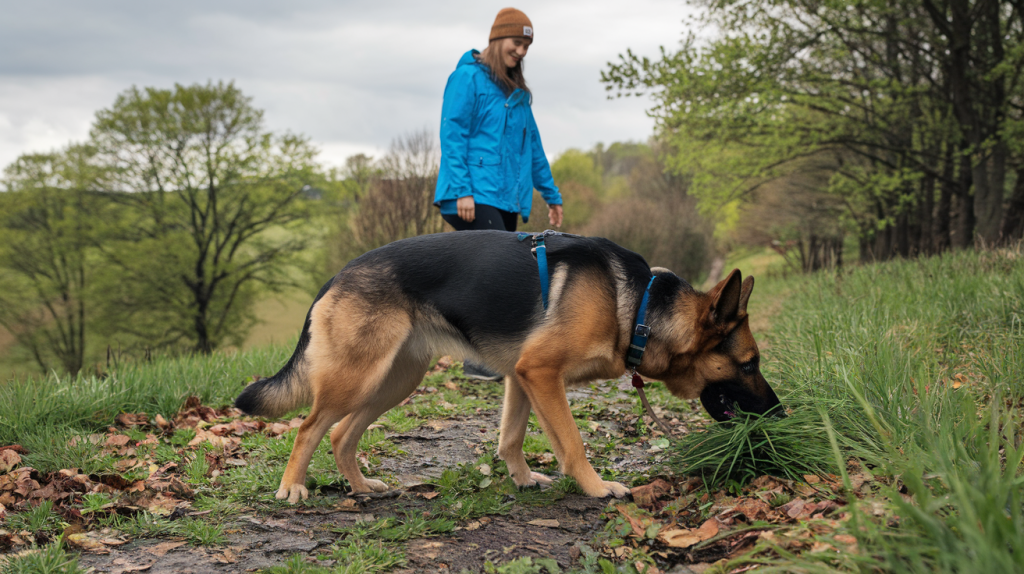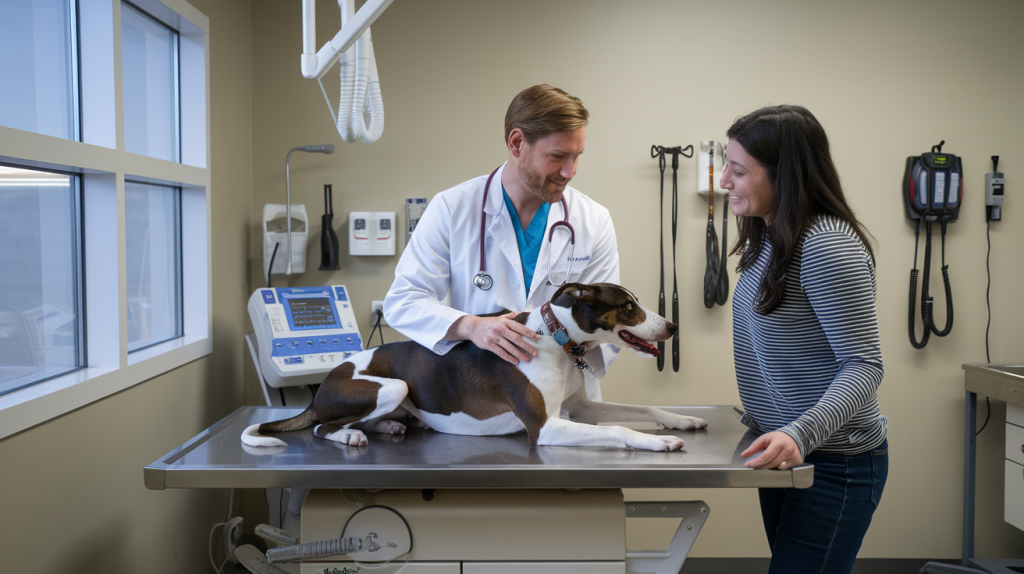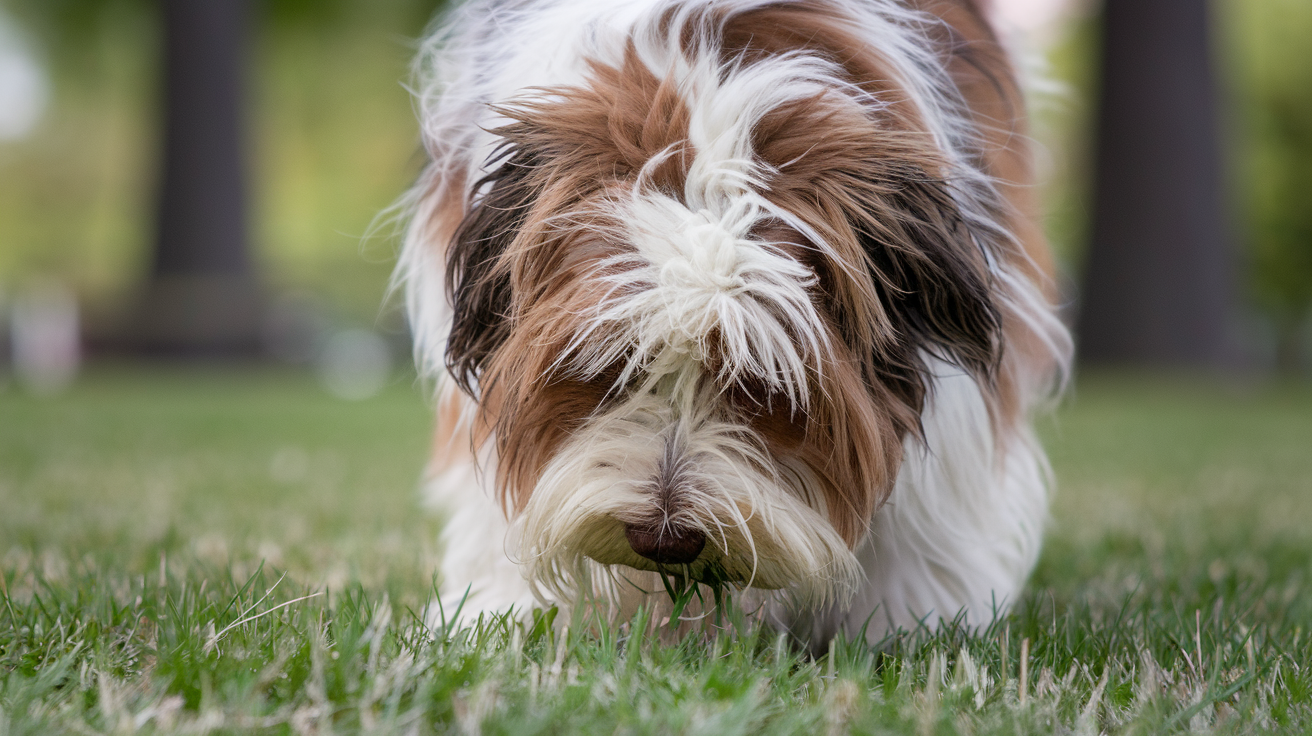Have you ever seen your dog eating grass and thought, “Is this normal?” Dogs eating grass is quite common. It makes many owners wonder if it’s safe or a sign of a problem. A 2008 study in Applied Animal Behaviour Science showed that eating plants is normal for dogs. This helps us to understanding their evolutionary behavior better. Still, many dog owners worry about grass eating due to misunderstandings about dog health and instincts. We’re going to explore why your dog eats grass, looking at instincts, digestive health, and emotional reasons.
Key Takeaways
- Grass eating is often a normal behavior for domestic dogs.
- Many dogs consume grass without showing any signs of illness.
- Understanding your dog’s instincts can help you address grass eating behavior.
- Dogs may eat grass for various reasons, including digestive health and emotional factors.
- Frequent grass eating could indicate nutritional deficiencies or health concerns.
Understanding Grass Eating in Dogs
Many dogs eat grass, with about 79% trying it. It’s a common action we should understand. They might do it for many reasons, from instincts to learned behaviors.
Some dogs just like how grass tastes and it’s texture. Boredom can sometimes make them eat grass too. Giving dogs more things to do can help stop grass consumption.
Eating grass can also help a dog’s stomach. It might fix upset stomachs or lack of nutrients. Grass has fiber which is good for their digestion.
Less than 25% of dogs throw up after eating grass. So, not all dogs eat grass to vomit. It’s okay to let them eat grass now and then, but watch how much they eat.
Watch your dog habits to understand their health. If they have stomach problems, see a vet. This helps find any health issues and keeps an eye on their grass eating.
Common Reasons Dogs Eat Grass
There are a few reasons why dogs might eat grass. Many dogs do it without getting sick, showing they may just like it. It seems they enjoy how grass tastes or feels.
Dogs sometimes need more fiber, which is why they eat grass. They are omnivores and need roughage to keep their gut healthy. Grass helps with their digestion, which is very important.
How a dog feels can make them eat grass too. Dogs who feel anxious or bored might eat grass. It’s similar to how people bite their nails. If a dog eats a lot of grass, they might need more fun activities or even help from a vet.
Some health issues can drive dogs to eat more grass too. If a dog has stomach problems, they might eat grass to feel better. While most dogs are okay after eating grass, a few can show signs of an underlying stomach issue.
| Reason for Grass Eating | Explanation | Potential Health Implications |
|---|---|---|
| Digestive Aid | Provides roughage, aiding digestion and bowel movement. | May alleviate constipation issues. |
| Behavioral Coping | Serves as an outlet for boredom or anxiety. | Can indicate need for a behavioral analysis. |
| Health Condition Indicator | May signal underlying gastrointestinal issues or discomfort. | Requires veterinary assessment to rule out serious problems. |
Canine Instincts and Natural Behavior
Dogs eating grass is linked to their evolution. Their wild ancestors ate plants as part of their diet. This shows dogs today still have natural instincts. Studies say wild dogs have 2% to 10% of plants in their stomachs.

This grass-eating habit in dogs can tell us a lot. You might notice your dog eats grass before meal times. This is because they feel hungry. Eating grass can also help them when they feel sick in their stomachs. Grass eating may also help to alleviate anxiety in dogs.
About 22% of dogs throw up after eating grass, a study shows. But only 9% were sick before eating grass. This hints that grass might help some dogs feel better. But not all dogs throw up after eating grass.
But, eating grass can be dangerous. Grass might have bad chemicals (lawn fertilizers, etc) or harmful bugs & parasites. These can harm your dog’s health. So, keep an eye on where your dog eats grass to keep them safe.
Dogs eat grass because of their past. Watching this behavior can help us understand and take care of our pets. We must make sure they stay healthy while following their instincts.
The Link Between Grass Eating and Digestive Health
Many dog owners see their pets eat grass. They notice no stomach problems in them. This makes us wonder how grass eating affects their belly health. Experts say dogs need the right amount of fiber for a healthy gut. Fiber helps with digestion and eases belly issues.
Grass eating is normal for many dogs. However, for some, it may help with gut problems like pancreatitis or bowel disease. But, watching how much grass they eat is important. Eating too much grass can cause vomiting or blockages.
Less than 10% of grass-eating dogs seem sick first. It seems many dogs just have a natural urge to eat grass. But, there is a risk if the grass has chemicals like pesticides. Owners should protect their pets from parasites and keep them away from toxic areas.
Stress can make dogs eat grass, similar to nail-biting in humans. Playing with dogs can help lower their stress and stop grass eating. If a dog eats grass too much, a vet’s advice might help find out why.
| Statistic | Details |
|---|---|
| Dogs Without Stomach Upset | Most dogs eat grass without displaying any signs of stomach upset. |
| Gastrointestinal Problems | Dogs may suffer from issues like pancreatitis or inflammatory bowel disease. |
| Fiber Intake | Appropriate fiber intake is necessary for digestive health. |
| Behavior Triggers | Anxiety and boredom can prompt dogs to eat grass for comfort. |
| Pesticide Risks | Eating grass can pose risks if treated with harmful chemicals. |
Canine Psychology: Emotional Factors Behind Grass Consumption
Dogs sometimes eat grass because they feel bored, anxious, or lonely. It’s a way for them to cope with their feelings. Studies have found that 68% of dog owners say their pets eat grass often. This action is common in many dogs.
Dogs, especially young ones, might eat grass but not get sick. This shows their eating might not be due to feeling unwell. About 79% of dog owners have seen their dogs munching on plants, mostly grass.
Only a small number, 8%, of dogs throw up after eating grass. This suggests the behavior meets emotional needs rather than digestive ones. Things like missing their owners can make dogs eat more grass. This shows how their mental health is important.
More exercise can help dogs deal with these emotions. Exercise helps use up extra energy and reduces stress. Eating grass can also aid their digestion by adding fiber. It’s key for owners to keep an eye out. Dogs with anxiety may show it through their actions.
It’s vital to know these emotional reasons to help your dog live better. Timely advice from a vet is also important for dogs that can’t stop eating grass. This ensures your dog is happy and healthy.
Health Implications of Grass Eating
Many dogs eat grass and often don’t get sick. But, there are some health risks to think about. Eating grass now and then usually doesn’t hurt your pet’s health. A study showed less than 10% of dogs felt sick before eating grass. Only about 25% got sick after eating grass. So, for most dogs, eating grass is not harmful.
Yet, it’s important to know where the grass comes from. Lots of grassy places use dangerous chemicals like pesticides. These can be bad for your dog’s health if they eat the grass. Also, some grassy spots may have parasites that harm your pet.
Research finds that younger dogs often eat grass. They might do this as a way to try different foods. Dogs eat both meat and plants. Some dogs may have a nutrient deficiency, or may eat grass to get more fiber. This can help them digest food better and keep their bowels moving.
Dog owners should watch what kind of grass their dogs eat. While eating grass is usually safe, eating the wrong type can cause problems. It’s key to keep your dog away from grass with chemicals. Watching how your dog acts can help you spot any health issues early.
Canine Diet and Nutritional Deficiencies
A dog’s diet is very important for its health and actions. Some breeds are particularly prone to digestive issues. If they don’t get enough nutrients, dogs might end up eating grass. They need vitamins and minerals, like iron and calcium. A good canine diet stops them from eating things that aren’t food.
Some dogs eat grass because they lack nutrients. Checking their diet helps find what’s missing. They need things like thiamine for their health. If they don’t get enough fiber, they might eat grass to help their digestion.
A balanced diet also keeps their gut health in check. This can affect their behavior. Adding things like fructooligosaccharides (FOS), a type of plant sugar that can be found in many fruits and vegetables, or can be made in a lab, helps their gut and immune system. Watching what they eat and adding supplements can fix these imbalances.
Instead of grass, it is recommended to give dogs lettuce, celery, or baby carrots. These are much safer and healthier. Always obtain professional veterinary advice to make sure their diet meets your pet health needs. It should have all the essential nutrients.

| Nutrient | Role in Canine Health | Sources |
|---|---|---|
| Iron | Supports red blood cell production | Lean meats, fish, and fortified grains |
| Calcium | Essential for bone health | Dairy, leafy greens, and bones |
| Zinc | Important for immune function | Meat, fish, and whole grains |
| Thiamine | Aids metabolism and nerve function | Pork, eggs, and whole grains |
| Niacin | Supports skin health and digestion | Meat, fish, and cereals |
| Vitamin C | Boosts immune health | Citrus fruits, berries, and vegetables |
| Vitamin D | Regulates calcium absorption | Fatty fish, egg yolk, and fortified foods |
Having a balanced diet stops dogs from eating grass. Check and change their diet as needed. This keeps your pet happy and healthy.
Why Does My Dog Eat Grass?
Many dogs like to eat grass, and it can be for dietary reasons. They are omnivores and might need more fiber. Grass has a lot of fiber, which is good for their canine health.
Although grass eating can be considered normal dog behavior, it can also be about getting certain nutrients they may be lacking. Grass is full of chlorophyll, magnesium, and nitrogen. These are healthy for your dog. But, remember to keep them away from chemicals like pesticides. Try growing wheatgrass for them to munch on safely.
Young dogs often eat grass out of curiosity. They like exploring different tastes. Not many get sick from it, and few feel bad afterward. It’s key to know when it’s okay and when it’s a problem.
Dogs might also eat grass if they’re not getting enough fiber. Grass can help them get rid of bad stuff in their stomach. If your dog does this a lot, they may need more fiber. Find safe things for them to chew on to feel better.
Some dogs eat grass if they’re bored or need more fun. Make sure they have exciting things to do. Teach them in a kind way to stop eating grass. That way, they stay happy and healthy.
Solutions for Managing Grass Eating Behavior
To help your dog, start by enhancing their well-being. Give them interactive toys for mental stimulation. These toys keep their mind busy and away from eating grass. This makes your bond with them stronger.
More exercise is also key. Tailored walks and fun play sessions help dogs use their energy. This means they’re less likely to eat grass. Try activities like fetch or agility courses for their health.
Understanding why your dog eats grass is critical. Use training cues like ‘leave it’ to stop them. This way, you encourage good behavior and stop the bad ones.
Give your dog safe snacks like wheatgrass. This stops them from eating harmful grass and fills any nutrient gaps. They’ll love it, and it’s good for them.
Use toys, exercises, and training to stop grass eating. Know why they do it to handle it well. This approach is kind and effective.
Preventing Unsafe Grass Eating
Keeping pets safe is very important. This includes stopping them from eating bad grass. Owners should check their lawns for toxic plants that can hurt dogs. Some grasses are fine, but many plants are not good for them. Knowing which plants are safe is very important.
To keep your dog safe, make a safe place for them. Make sure your yard doesn’t have bad chemicals from lawn care. These chemicals can make dogs very sick if they eat them.
Stop your dog from eating grass to start with. Teach them to listen to you and pay attention during playtime. This helps stop bad habits. It’s important to watch what they eat. Especially since many dogs eat grass.
You can also make the yard more fun for your dog. Give them toys and places to play. This makes them not want to eat grass. It keeps them away from plants that are not safe.
| Safe Practices | Unsafe Practices |
|---|---|
| Regular lawn inspections for toxic plants | Leaving known toxic plants in the yard |
| Using pet-safe lawn care products | Using chemical herbicides and pesticides |
| Training to respond to commands | Ignoring dangerous behaviors |
| Creating engaging outdoor activities | Allowing unsupervised outdoor time |
Veterinary Advice and Recommendations
If your dog eats grass often, you should talk to a vet. Although many dogs eat grass and seem okay, a vet check is wise. This can show if your dog has stomach issues or needs different food.
Knowing when to see the vet is part of caring for your dog. For example, grass eating followed by getting sick can mean your dog needs more fiber. Your vet can offer advice that fits your dog’s needs.
Sometimes, dogs eat grass because they’re bored or anxious. Keeping them busy helps stop this. Your vet can suggest fun activities and toys. These help keep your dog happy and healthy.
Watch how your dog acts after eating grass. Signs of trouble mean it’s time to see the vet. Quick action helps with serious issues like stomach problems. A vet’s advice is key in keeping your dog well.

| Behavior | Possible Cause | Veterinary Action |
|---|---|---|
| Excess grass consumption | Gastrointestinal upset | Dietary assessment and recommendations |
| Grass eating followed by vomiting | Lack of fiber | Suggest dietary changes |
| Frequent grass eating | Boredom or anxiety | Behavioral consultation and activity recommendations |
| Signs of distress post grass consumption | Potential health issues | Immediate veterinary evaluation |
Pica in dogs
Pica in dogs is a behavioral condition characterized by the habitual consumption of non-food items.
This intriguing phenomenon often raises concerns among pet owners, who might wonder why their furry friends are drawn to objects such as rocks, grass, or even household items like socks and furniture.
While it can stem from a variety of reasons, understanding pica in dogs involves delving into the complexities of canine instincts and natural behavior.
Dogs, much like humans, can develop unusual habits, and pica is one expressing a deeper issue that may range from nutritional deficiencies to stress or boredom.
One of the primary motivations behind pica in dogs can be traced to their natural behavior. Many breeds possess strong instincts that can manifest in peculiar ways, especially if they are not sufficiently engaged or stimulated.
Dogs are naturally curious creatures, often exploring the world through their mouths.
When they lack appropriate outlets for this curiosity—be it through play, exercise, or environmental enrichment—they may inadvertently turn to ingesting non-food items.
In such cases, it’s crucial for pet owners to channel these instincts into healthier activities, like interactive toys or increased outdoor play, to reduce the likelihood of pica episodes.
Another important aspect to consider is the potential link between pica and underlying health issues. Dogs that exhibit this behavior could be trying to communicate a nutritional need or discomfort.
Certain deficiencies, particularly in minerals, may lead to cravings for strange substances. Moreover, anxiety or stress can also trigger pica, as dogs may resort to chewing or eating inappropriate items as a coping mechanism.
Recognizing the motivations behind pica is essential for effective intervention, and consulting a veterinarian may provide valuable insights into addressing the behavior.
Ultimately, while pica in dogs can be perplexing, understanding it as an expression of natural behavior and instinct can illuminate potential solutions.
Ensuring that dogs receive adequate mental stimulation and addressing any health concerns can help mitigate this behavior. As with many aspects of canine care, patience and proactive engagement are key to fostering a happy and healthy relationship with our four-legged companions.
Conclusion
Grass eating in dogs can give insights into their health. Few dogs vomit after eating grass. This behavior could be a natural instinct or a sign of problems.
Watching your dog’s health and habits is important. Many dogs eat grass without harm if they’re healthy and protected from parasites. But, too much grass eating might show a health issue. Regular vet visits and tests can spot any health implications like parasites, especially if your dog also eats soil.
Understanding grass eating can improve your dog care. A balanced diet, fun toys, and kindness can reduce their need to eat grass. This makes your dog’s life better every day.


